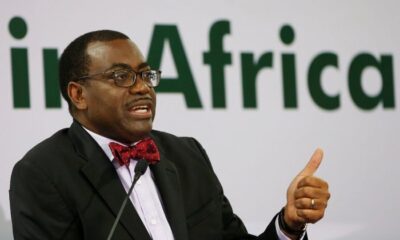Economy
Non-Oil Sector Drags Down Q1 GDP Growth to 1.95%
Published
7 years agoon

- Non-Oil Sector Drags Down Q1 GDP Growth to 1.95%
Despite the favourable oil price environment in the first quarter of 2018, the decline in non-oil sector output during the period weighed heavily on the Nigerian economy, resulting in a Gross Domestic Product (GDP) growth rate of 1.95 per cent, down by -0.16 per cent from 2.11 per cent recorded in the fourth quarter of 2017.
In its Q1 2018 GDP report released Monday, the National Bureau of Statistics (NBS) said the 1.95 per cent GDP growth was still better than the -0.91 per cent GDP growth rate recorded in the corresponding period in 2017.
Aggregate GDP in Q1 2018, however, stood at about N28.5 trillion in nominal terms, higher than the N26.03 trillion recorded in Q1 2017.
“This performance was higher when compared to the first quarter of 2017 which recorded a nominal GDP aggregate of N26.028 trillion, thus presenting a positive year-on-year nominal growth rate of 9.36 per cent.
“This rate of growth was, however, lower relative to the growth recorded in Q1 2017 by -7.70 percentage points at 17.06 per cent but higher than the preceding quarter by 2.14 percentage points at 7.22 per cent.
“Quarter-on-quarter, real GDP growth was -13.40 per cent as oil production estimates for the third and fourth quarters of 2017 have been revised and oil GDP for those quarters have been adjusted accordingly,” the NBS said.
While the economy posted some growth in the oil sector in Q1 2018, the NBS noted that it contributed only 9.61 per cent of total GDP, with the non-oil sector accounting for 90.39 per cent of GDP.
In Q1 2017 and Q4 2017, the oil sector contributed 8.53 per cent and 7.35 per cent, respectively, to total GDP.
The contribution of the oil sector came at a time of increased daily oil production of an average of 2.0 million barrels per day (mbpd), higher than the 1.95 mbpd recorded in Q4 2017.
According to the NBS report, the real growth of the oil sector was 14.77 per cent (year-on-year) in Q1 2018, representing an increase of 30.37 percentage points relative to the rate recorded in the corresponding quarter of 2017. Quarter-on-quarter, the oil sector also grew by 13.24 per cent in Q1 2018.
“In the period under review, the nation recorded an average daily oil production of 2.0 million barrels per day (mbpd), higher than the daily average production recorded in Q4 2017 by 0.05 mbpd and real growth of the oil sector was 14.77 per cent (year-on-year) in Q1 2018.
“This represented an increase of 30.37 percentage points relative to the rate recorded in the corresponding quarter of 2017. Quarter-on-quarter, the oil sector grew by 13.24 per cent in Q1 2018.
“The oil sector contributed 9.61 per cent to total real GDP in Q1 2018, up from 8.53 percent and 7.35 per cent recorded in the Q1 2017 and Q4 2017, respectively,” said the statistical agency.
Conversely, the non-oil sector grew by 0.76 per cent in real terms, which was higher by 0.04 percentage points relative to the growth recorded during the same quarter of 2017, but 0.70 percentage points lower than in Q4 2017.
The non-oil sector’s growth was largely propelled by agriculture (crop production), financial institutions and insurance, manufacturing, transportation and storage, as well as information and communication.
“In real terms, the non-oil sector contributed 90.39 per cent to the nation’s GDP during the review period, although it was lower than the 91.47 per cent posted in the first quarter of 2017 and 92.65 per cent in the fourth quarter of 2017.
“The non-oil sector grew by 0.76 per cent in real terms during the reference quarter. This was higher by 0.04 percentage points compared to the rate recorded in same quarter of 2017, but 0.70 percentage points lower than the fourth quarter of 2017.
“This sector was driven mainly by agriculture (crop production); other drivers were financial institutions and insurance, manufacturing, transportation and storage, and information and communication.
“In real terms, the non-oil sector contributed 90.39% to the nation’s GDP, lower than the 91.47 percent recorded in the first quarter of 2017 and 92.65 per cent recorded in the fourth quarter of 2017,” the report said.
The first quarter GDP report of the NBS was released just as the International Monetary Fund’s (IMF) Senior Resident Representative and Mission Chief for Nigeria, Mr. Amine Mati, stressed that the country’s GDP growth needed to overtake its population growth for the impact to be felt by Nigerians.
Mati said this while speaking in Lagos Monday at the presentation of the IMF Regional Economic Outlook for Africa titled: “Domestic Revenue Mobilisation and Private Investment.”
The IMF official pointed out that “to really make a difference, that trend needs to be reversed – the growth rate really needs to surpass population growth to make a difference”.
He said the Nigerian economy and other countries in the region ought to be growing at a rate of between three and five per cent.
For Nigeria, he said there was need to remove tax exemptions, expand income taxes, review the property tax, restructure tax administration in the country and improve compliance, to stimulate growth.
“In Nigeria, you need to double tax compliance to GDP ratio from 25 per cent to 50 per cent. Those are the types of measures that, as part of a comprehensive package, can make the difference in increasing revenue mobilisation.
“Raising growth is really key for the challenges ahead in Nigeria and sub-Saharan Africa. For the region, we can say the average growth rate on a per capita basis is low.
“And a third of African countries in 2017, with Nigeria as one of them, have seen a decline in per capita GDP level. And we expect some of that to continue. To really make a difference, that trend needs to be reversed,” Mati explained.
According to him, among African countries with high capita income, the level of implementation of the Sustainable Development Goals (SDGs) was high, adding that such countries also have low infant mortality rates.
“All of these are linked. Private investment, at about 13 per cent in the region, remains too low. The recent recession, oil price collapse, has also exacerbated the situation.
“Oil prices have gone up and this is an opportunity for these countries to really use the opportunity provided by the pick up in oil prices to initiate some reforms that would encourage more private sector investments,” he said.
Also speaking at the event, the Director General, Debt Management Office (DMO), Ms. Patience Oniha, pointed out that with the N500 billion hike in the proposed 2018 budget from N8.61 trillion to N9.12 trillion, her office would have to contend with how to fill the gap.
“The National Assembly passed the budget last week and we know it was higher than what the executive presented. So, as a debt manager, what I am looking for is to see where the funding of that incremental size may come in from. Am I supposed to be borrowing to make up for that shortfall?” she wondered.
She defended the federal government’s aggressive borrowings, just as she explained that the country’s debt strategy was aimed at ensuring that the private sector is not crowded out.
“We borrow because there is a revenue shortfall. All of the government’s borrowings are targeted at infrastructure development.
“Without borrowing, we won’t be able to deliver on the budget and I think we should be clear about that and a lot of that went into capital spending,” she added.
According to the DMO boss, the refinancing of the federal government’s domestic debt which led to a decline in interest rates meant “that there is about N200 billion out there in the market for the private sector to invest in”.
“You will also notice that we are retiring some of the treasury bills as they mature. The main challenge I am giving to the private sector is that why are all these monies still sitting where they shouldn’t be?
“Why has it not reached the private sector because that was the key objective of our strategy,” she said.
The chief executive, Nigerian Economic Summit Group, Mr. Laoye Jaiyeola, stressed the need to block the “significant leakages,” in the country using technology.
Market Wants Lower Policy Rate
Also reacting to the GDP figures released Monday, the chief executive of Financial Derivatives Company Limited, Mr. Bismarck Rewane, said the weak GDP numbers coincided with the drop in the Purchasing Managers’ Index (PMI) for April that was reported by FBN Quest, as well as the decline in consumer confidence in the first quarter.
According to Rewane, it pointed to the fact that the economy was being strangulated by high interest rates.
“The reality is that if they don’t bring down those interest rates and increase credit to the private sector, they are just going to strangulate this economy. The economy will remain sub-optimal.
“Look at the sectors that contracted, which is more interesting. The only sector that employs people that expanded was manufacturing. But trade, construction, transport, all of them contracted. So, those sectors are still in recession, and agriculture also slowed down,” he said.
The chief executive of Cowry Asset Management Limited, Mr. Johnson Chukwu, said the development should be of great concern to the policymakers.
“This slowdown at a time when there were no major bottlenecks in the economy should worry everyone. Bottlenecks in the sense that there was enough forex liquidity, the crude oil price was above $60 per barrel.
“So, maybe the issue has to do with the cost of funds and availability of credit because if this slowdown continues, we may slip back into a recession. So, if anything happens to oil production today, we may be in a difficult position,” he added.
Chukwu pointed out that members of the Monetary Policy Committee (MPC), whose two-day meeting ends Tuesday, will be in a very “delicate” position.
“The budget has just been passed, so a lot of liquidity will come into the system. And it will be difficult for them to bring down the policy rate when they expect excess liquidity to come into the system.
“Also, there is new forex pressure as you can see from the depreciation in the external reserves, which may compel the CBN to increase the fixed income rate to sustain foreign portfolio inflow. So, it may be difficult for the MPC to reduce the policy rate,” he said.
Also, a senior lecturer at the Lagos Business School, Dr. Bongo Adi, insisted that the “misalignment between monetary and fiscal policy” was a major factor responsible for the slowdown in growth.
“Even though they say they are pushing for fiscal expansion, the interest rate is still at 14 per cent and it has been like that for close to two years. It is just like the conditions under the recession have not changed.
“We are operating like we are still in a recessionary environment. I don’t understand the justification for keeping rates high. It is this hold on the policy rate that is causing this lack of acceleration in growth,” Adi noted.
Is the CEO and Founder of Investors King Limited. He is a seasoned foreign exchange research analyst and a published author on Yahoo Finance, Business Insider, Nasdaq, Entrepreneur.com, Investorplace, and other prominent platforms. With over two decades of experience in global financial markets, Olukoya is well-recognized in the industry.

You may like
-
Nigeria Surpasses OPEC Quota with 1.51 Million bpd, Targets 2.06 Million in 2025
-
Global Investors Commit $7.6 Billion to Nigeria’s Development at AIF 2024
-
Nigeria-China Trade Strengthened as Grimaldi Introduces Direct Shipping Line
-
Nigeria’s GDP Records 3.46% Growth in Q3 Spurred by Non-Oil Sector
-
President Tinubu Presents N47.9trn 2025 Budget As Debt Servicing, Security, Infrastructure Take Lion Shares
-
I’m Not Nigeria’s PR, UK Party Leader, Kemi Badenoch, Tells Shettima













